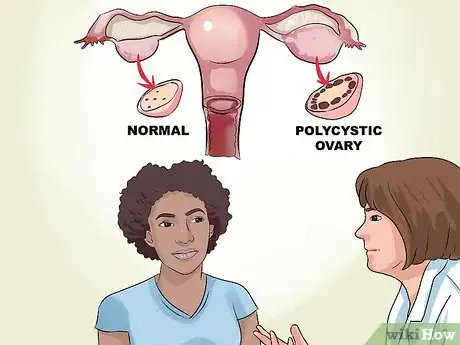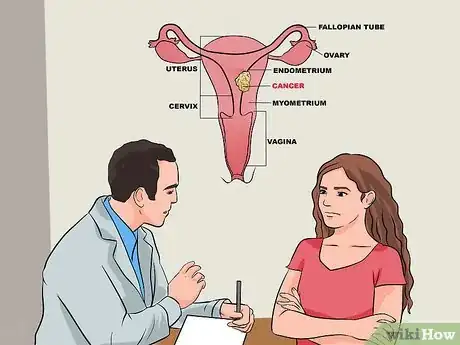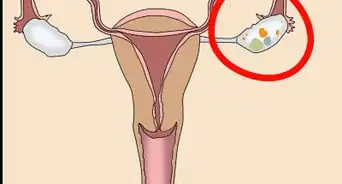This article was medically reviewed by Annette Lee, MD. Dr. Lee is a Reproductive Endocrinologist and Medical Director at RADfertility in Newark, Delaware. She has over 17 years of experience with IVF and is double board certified in Obstetrics & Gynecology. She has received Castle Connolly’s Regional Top Doctor Award for five years and Vitals.com Patient Choice Award for five years as well. She completed her medical degree at the Drexel University School of Medicine.
There are 17 references cited in this article, which can be found at the bottom of the page.
This article has been viewed 92,147 times.
Research shows that polycystic ovary syndrome (PCOS) is a hormonal imbalance condition that affects about 10% of women of childbearing age.[1] Women with PCOS typically experience irregular periods, acne, weight gain, fertility problems, and other symptoms. There are also typically benign cysts on the ovaries that can be detected by an ultrasound. PCOS may develop in girls as young as 11, but it can also develop later, in your teens, twenties, or beyond. Experts note that because the condition may seriously affect your hormones, menstrual cycle, personal appearance, and fertility, early diagnosis is critical.[2] Recognizing PCOS early and getting medical treatment may help minimize its long-term complications.
Steps
Knowing the Key Diagnostic Symptoms of PCOS
-
1Track your period. If you have PCOS, you will likely have irregular, infrequent, or no menstrual period. Look for noticeable menstrual irregularities, including long intervals between menstrual periods, the prolonged absence of menstrual periods, very heavy or very light menstrual periods, and bleeding between menstrual periods. Check for the following:[3]
- Length of time between periods is longer than 35 days
- Fewer than 8 periods per year
- No period for 4 months or longer
- Lengths of time when you have either very light or very heavy periods
- Studies show that about 50% of women with PCOS have prolonged intervals between their menstrual periods (this is known as oligomenorrhea). About 20% of women with PCOS have no menstrual periods (this is known as amenorrhoea). Infrequent or irregular ovulation is called oligoovulation. Anovulation is the complete absence of ovulation. If you suspect that you are not ovulating – whether the root of the problem turns out to be PCOS or something else – you should see a doctor.
-
2Look for increased facial and body hair. Healthy women have small amounts of androgens (“male” hormones) present in their bodies. Polycystic ovaries tend to produce larger amounts of androgens due to higher levels of the luteinizing hormone (normal levels of this hormone regulate the menstrual cycle and the production of eggs[4] ) and insulin. This problem may produce upsetting symptoms, including increased facial and body hair. This is called hirsutism.[5]
- Extra hair might grow on your face, stomach, toes, thumbs, chest or back.
Advertisement -
3Monitor for hair loss and baldness. Increased androgens in the body may also cause hair loss, thinning hair, or male pattern baldness. You may lose hair gradually. Check for more than normal amounts of hair in the shower drain.[6]
-
4Look for oily skin, acne or dandruff. Hyperandrogenism (increased androgens) may also cause oily skin with increased acne. You may also experience dandruff, which is a scalp condition in which skin flakes off.[7]
-
5Ask your doctor about polycystic ovaries. A polycystic ovary is an ovary with more than 12 cysts, each measuring 2 to 9 millimeters in diameter. The cysts are located around the periphery of the ovary, leading to an increase in ovarian volume. In some cases, you may need surgery to remove these cysts. To determine if you have polycystic ovaries, your doctor will need to order an ultrasound.[8]
- You should have a reproductive endocrinologist review the results of your ultrasound. A reproductive endocrinologist specializes in reproductive and fertility issues, such as PCOS, endometriosis, in-vitro fertilization and uterine abnormalities. If the ultrasound is reviewed by a non-specialist, a polycystic ovary is often called 'normal,' meaning no tumor is seen. This is because this doctor is not trained to see specific abnormalities. Sometimes, doctors might misdiagnose the problem, or suggest that the patient exercise more to lose the weight caused by PCOS.
Recognizing the Associated Symptoms of PCOS
-
1Watch for hyperinsulinemia. Hyperinsulinemia is an excessive level of insulin. It is sometimes confused with diabetes or hypoglycemia, but it is a different condition. For women with PCOS, it results from your body having a tendency to resist the effects of insulin.[9] Visit your doctor if you experience some of the following symptoms:[10]
- Weight gain
- Sugar cravings
- Feeling hungry frequently or intensely
- Difficulty concentrating or staying motivated
- Anxiety or panic
- Fatigue
- As a symptom of PCOS, hyperinsulinemia is connected to the increased production of androgens. This can cause oily skin, acne, facial and body hair. In addition, you may gain weight around your abdomen.
- If your doctor suspects you have hyperinsulinemia, she will likely order a glucose tolerance test (GTT).
- Treatment for hyperinsulinemia includes a diet and exercise plan and may also include a drug called Metformin, which can reduce your insulin levels. Whether your doctor prescribes Metformin or not, ask for a referral to a dietician. A good nutrition plan is a crucial part of treatment.[11]
- Check fasting insulin, glucose, hemoglobin A1c and c-peptide levels. Although there is no definitive test to diagnose insulin resistance, these levels are often higher than normal in PCOS patients with insulin resistance.
-
2Pay attention to infertility. If you are struggling to get pregnant and you have irregular periods, you may have polycystic ovary syndrome. In fact, PCOS is the most common cause of infertility. Irregular or absent ovulation makes it difficult or impossible to conceive.[12]
- Higher hormone levels sometimes increase the risk of miscarriage in women with PCOS who do manage to get pregnant. See your doctor if you cannot get pregnant.
-
3Take obesity seriously. Obesity is always a health concern, but it may also be a sign of PCOS. Because of increased levels of insulin, women with PCOS often accumulate fat around the waist and wind up with a pear-shaped appearance, and they typically have a difficult time losing weight.[13]
- About 38% of women with PCOS are obese. An obese adult typically has a body mass index (BMI) of 30 or higher.[14]
-
4Look for skin changes. If you have PCOS, you may develop velvety, light brown or black patches of skin on your neck, armpits, thighs, and breasts (these are called acanthosis nigricans). You may also develop skin tags. These are small flaps of skin, which often occur in the armpits or on the neck.[15]
-
5Track pelvic and abdomen pain. Some women with PCOS experience pain or discomfort in the pelvis, abdomen or lower back. Pain may be dull or stabbing, and it may range in intensity from mild to severe. The pain or discomfort may be similar to the pain you feel at the beginning of a menstrual period. [16]
-
6Monitor the quality of your sleep. Some women with PCOS have sleep apnea, a condition in which you snore and stop breathing periodically while asleep. This can result either from increased estrogen and testosterone levels or from obesity, both of which are associated with PCOS.[17]
-
7Be aware of any psychological symptoms. Women with PCOS seem to be quite susceptible to anxiety and depression. These symptoms may have physical causes, such as hormonal imbalances. They may be a reaction to the other symptoms, especially infertility.
-
8Examine your family history. PCOS can be a hereditary condition. If your mother or sister has PCOS, you may also develop it. Consider your family’s medical history to determine if you are predisposed to having PCOS.[18]
- It is common for women with PCOS to have family members who have diabetes.
- It is common for women with PCOS to have been unusually small or unusually large babies at birth.
Knowing the Long-Term Complications of PCOS
-
1Visit your doctor. If you suspect that you may have PCOS, visit your doctor or gynecologist to have a checkup. Your doctor will assess your condition, asking you about your symptoms and medical history.[19]
- Medical history: Your doctor will talk to you about your family history and your lifestyle habits such as exercise, smoking, diet and stress. She will also ask you about your attempts to get pregnant.
- Physical and pelvic exam: Your doctor will weigh you, check your body mass index. She will take your blood pressure, examine your glands, and give you a pelvic exam.
- Blood tests: You will get some blood tests. These will check your glucose, insulin, cholesterol, and androgen levels, along with some other levels.
- Vaginal ultrasound: You may get an ultrasound that will determine if you have cysts on your ovaries.
-
2Keep your weight in check. If you are overweight or obese, you may suffer from more symptoms of PCOS. A healthy lifestyle may help you avoid some of the most severe consequences of PCOS.
- Eat nutritious foods, avoid junk foods, get plenty of exercise, and do not smoke.
- Become familiar with the glycemic index. This is a number that corresponds to the degree to which a food causes a high level of insulin release when it is consumed. You want to eat more foods with a low glycemic index and avoid foods with a high glycemic index. You can find the glycemic index of most common foods at www.glycemicindex.com.
-
3Pay attention to your blood pressure. High blood pressure is very common in women with PCOS. Get your blood pressure checked regularly.
- A healthy blood pressure for women is 120 over 80 less.[20]
-
4Watch for cardiovascular problems. Women with PCOS may be at increased risk of developing cardiovascular disease.[21] Make sure you get regular medical care, including cardiovascular check-ups.
- A healthy diet, exercise and weight loss can also help reduce the risk of cardiovascular problems.
-
5Be alert for signs of diabetes. Women with PCOS develop are at increased risk of developing diabetes. Some common symptoms of diabetes include:[22]
- Urinating frequently
- Feeling very thirsty or hungry
- Extreme fatigue
- Healing slowly from bruises or cuts
- Blurred vision
- Tingling, numbness or pain in your hands or feet
-
6Be aware of the risk of cancer. Having PCOS can put you at risk for endometrial (uterine) cancer, particularly if periods are infrequent or absent and this is not addressed by a physician.[23] When hormone levels are abnormal, a woman’s chance of developing cancer may potentially increase. These hormones can be increased levels of estrogen and androgens, with lowered levels of progesterone.
- This risk can be reduced by inducing regular periods either with birth control pills or with periodic administration of synthetic forms of progesterone to provoke a period. It can also be done using an IUD that contains progestin such as Mirena or Skyla.
References
- ↑ https://www.womenshealth.gov/a-z-topics/polycystic-ovary-syndrome
- ↑ https://www.womenshealth.gov/a-z-topics/polycystic-ovary-syndrome
- ↑ https://my.clevelandclinic.org/health/diseases/8316-polycystic-ovary-syndrome-pcos
- ↑ http://www.webmd.com/women/luteinizing-hormone
- ↑ http://www.womenshealth.gov/publications/our-publications/fact-sheet/polycystic-ovary-syndrome.html
- ↑ https://my.clevelandclinic.org/health/diseases/8316-polycystic-ovary-syndrome-pcos
- ↑ https://www.eatright.org/health/pregnancy/fertility-and-reproduction/polycystic-ovarian-syndrome
- ↑ https://www.nhs.uk/conditions/polycystic-ovary-syndrome-pcos/diagnosis/
- ↑ http://www.ncbi.nlm.nih.gov/pubmed/9165656
- ↑ http://www.diabetes.co.uk/hyperinsulinemia.html
- ↑ http://www.ncbi.nlm.nih.gov/pubmed/16599037
- ↑ https://www.womenshealth.gov/a-z-topics/polycystic-ovary-syndrome
- ↑ http://www.womenshealth.gov/publications/our-publications/fact-sheet/polycystic-ovary-syndrome.html
- ↑ https://www.ncbi.nlm.nih.gov/pmc/articles/PMC2861983/
- ↑ https://www.cdc.gov/diabetes/basics/pcos.html
- ↑ http://www.womenshealth.gov/publications/our-publications/fact-sheet/polycystic-ovary-syndrome.html
- ↑ https://www.pennmedicine.org/updates/blogs/fertility-blog/2014/may/pcos-and-sleep-apnea
- ↑ https://www.cdc.gov/diabetes/basics/pcos.html
- ↑ http://www.womenshealth.gov/publications/our-publications/fact-sheet/polycystic-ovary-syndrome.html
- ↑ https://www.heart.org/en/health-topics/high-blood-pressure/understanding-blood-pressure-readings
- ↑ https://www.hopkinsmedicine.org/health/conditions-and-diseases/polycystic-ovarian-syndrome-how-your-ovaries-can-affect-your-heart
- ↑ http://www.diabetes.org/diabetes-basics/symptoms/
- ↑ https://www.cancer.org/cancer/endometrial-cancer/causes-risks-prevention/risk-factors.html

























-Step-11.webp)





















































Medical Disclaimer
The content of this article is not intended to be a substitute for professional medical advice, examination, diagnosis, or treatment. You should always contact your doctor or other qualified healthcare professional before starting, changing, or stopping any kind of health treatment.
Read More...